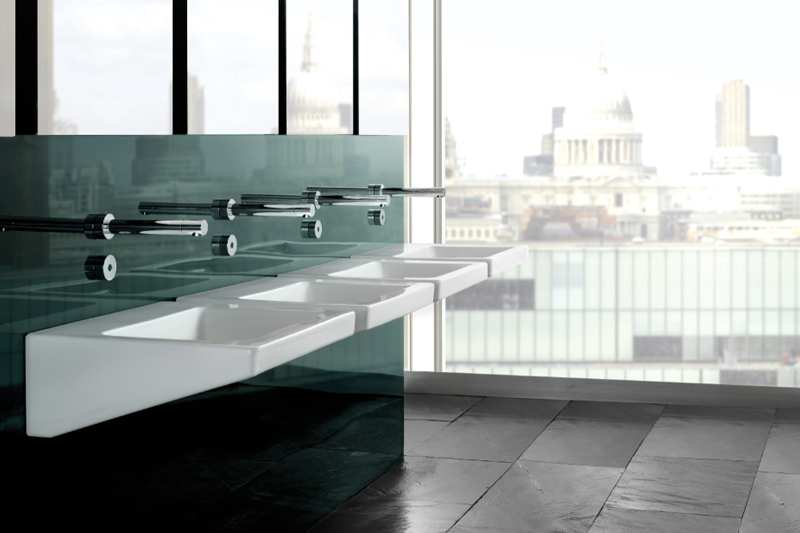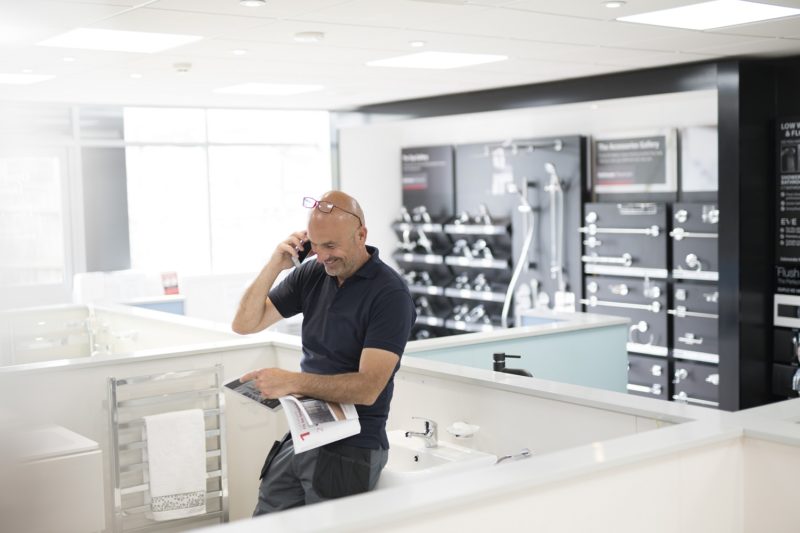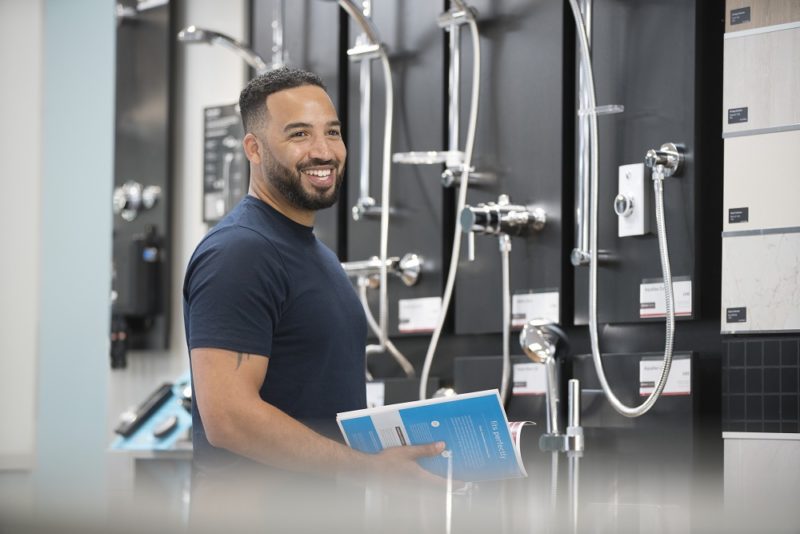
According to the latest data from AMA Research, the commercial bathrooms market continues to represent a key sector for merchants whilst a new report from Armitage Shanks outlines how design trends are evolving in such spaces. PBM reports.
The 7th edition of AMA Research’s Commercial Washrooms Market Report UK estimate that 72% of commercial washroom products are distributed via trade channels such as builders’ and plumbers’ merchants, as well as distributors. The report highlights how, unlike the domestic bathrooms market, the trend of the online retailer seems to have not (yet?) broken into the commercial washroom sector.
The report examines in detail the main product sectors of the commercial washrooms market, market sizes and product trends. Also reviewed are the key commercial end-use application sectors, such as education, healthcare, entertainment & leisure, offices, infrastructure, retail and industrial.
Within its findings, AMA has identified that the performance of the commercial washroom market is ‘heavily influenced’ by wider trends within the non-residential construction sector. Similarly, the idea of using branded goods from leading manufacturers that has been seen across other sectors is now becoming more popular within the commercial washroom marketplace. And whilst own label products remain a cost-effective option for the more price-conscious end of the market, AMA says that branded items serve to act as an “endorsement of quality”.
The results would appear to neatly lead into the considerations raised by a new study, commissioned by Armitage Shanks, into the impact commercial washroom design can have on user experience. Led by chartered architect and academic at the Belfast School of Architecture, Dr Saul Golden, the ‘Creating better washrooms’ report has revealed that wellbeing is the number one social factor that designers think will impact washroom design over the next five years.
The research, which surveyed 2,000 office workers and 400 commercial washroom designers from across Europe, found that nine in 10 office washroom designers believe this space can have an impact on end users’ wellbeing — a view shared by three quarters of office workers themselves. 64% of office workers surveyed even said that workplace washrooms affect their general job satisfaction.
In the UK, around 73% of designers agreed that washrooms are the most difficult rooms to design and plan in commercial projects. This is perhaps exacerbated by a global trend, as highlighted by the study, towards urbanisation and flexible working patterns which means people are using workplace washrooms for a wider range of reasons — for example, spending an increasing amount of time in these so-called ‘backstage microspaces’ to prepare for their ‘front stage appearance’.
Stephen Ewer, Managing Director of Ideal Standard UK (Armitage Shanks’ parent company), said: “The way people use commercial washrooms is undoubtedly changing as society becomes increasingly centred on city-based living, working and leisure activities. Given the evidence linking washrooms to improved job satisfaction and productivity, it’s also clear that there must be a move away from design that focuses solely on hygiene and utilitarian features, and towards design that considers personal comfort and other factors that affect wellbeing.
“This study forms part of our wider commitment to positively impact the future of modern living through evidence-based design and provides a clear demonstration that there needs to be a greater focus on washroom quality in line with end user expectations. The key to achieving this is through sustained collaboration; only by working closely with architects, designers and construction companies, as well as end users, will we be able to deliver impactful washrooms that go beyond mere function and rightfully play a central role in improving wellbeing and enhancing the lives of those who use these vital everyday spaces.”
“It’s clear that there must be a move away from design that focuses solely on hygiene and utilitarian features, and towards design that considers personal comfort and other factors that affect wellbeing.”
UK shower equipment market
Another recent report from AMA Research assesses the UK shower equipment market. Influenced by the current economic climate and its effect on consumer and business confidence, the current picture is described as “challenging” however the longer term prospects are said to be more positive, with overall market development expected to improve across the review period (to 2023).
The report highlights that, as the shower market reaches maturity in the UK, there is a significant and ongoing demand for replacement products. Manufacturers are offering ‘easy to install and replace’ equipment, whilst lifestyle and design trends are also supporting the refurbishment market.
Flexibility, durability and ease of use are described as key requirements, influencing a shift towards higher value products. For example, digital showers are set to grow at a steady rate in line with the use of digital technology and smart devices — and will continue to take share from other shower control sectors, particularly mixer showers and power showers.
Moderate to steady growth of 2-4% per annum is currently forecast from 2020 until 2023.
Installer partnerships
Perhaps indicative of a wider trend between merchants and their customers, Wolseley has re-launched its Installer Partnership Scheme, increasing the frequency of its rewards system from a quarterly basis to issuing bi-monthly sales incentives, and designed to help specialist bathroom installers grow their business.
Each member will also have access to their own bathroom specialists who will be on-hand to provide free advice and 3D design drawings to support installers in the decision-making process in tandem with their own customers. At a number of showrooms, Wolseley offers 4D virtual reality CAD, which allows installers to present fully-realised designs to their customers before committing to a purchase.
With Wolseley taking responsibility for delivery times that work for both parties once an order has been secured, scheme members will also gain access to supplier presentations and training events throughout the year.
 To download the full ‘Creating better washrooms’ report, visit https://www.idealspec.co.uk/resources/whitepapers.html
To download the full ‘Creating better washrooms’ report, visit https://www.idealspec.co.uk/resources/whitepapers.html










